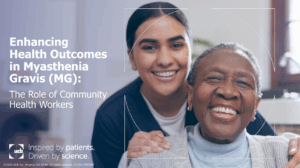Chronic Disease
Myasthenia Gravis
Myasthenia gravis is a chronic neuromuscular disease that causes weakness in the voluntary muscles. Voluntary muscles include muscles that connect to a person’s bones, muscles in the face, throat, and diaphragm. They contract to move the arms and legs and are essential for breathing, swallowing and facial movements. Myasthenia gravis is an autoimmune disease, which means that the body’s defense system mistakenly attacks healthy cells or proteins needed for normal functioning.
The onset of the disorder may be sudden. Symptoms may not be immediately recognized as myasthenia gravis. The degree of muscle weakness involved varies greatly among individuals.
Enhancing Health Outcomes in Myasthenia Gravis (MG): The Role of Community Health Workers
Significant gaps exist between the myasthenia gravis (MG) community and the healthcare system, affecting the quality of care and support available to those impacted. This training program is designed to bridge these gaps by equipping community health workers (CHWs) with essential knowledge and skills to effectively support individuals living with MG. Through comprehensive education, the program seeks to enhance the capacity of CHWs to deliver accurate information, facilitate access to healthcare services, and promote self-management strategies among patients. By empowering CHWs, we aim to strengthen the connection between the MG community and the healthcare system, ultimately aiming to improve health outcomes and quality of life for individuals with MG.




